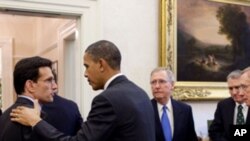In U.S. politics, there were signs of encouragement this week following the first post-election meeting between President Barack Obama and Republican congressional leaders. Mr. Obama faces a new political reality in January when Republicans take control of the House of Representatives and strengthen their minority in the Senate. Many experts see this latest version of divided government as a recipe for gridlock over the next two years. But that has not always been the case in the past.
The political tone from both sides seemed more positive than negative after their first meeting.
Republican leaders called it polite and frank, while President Obama described it as very productive.
"The American people did not vote for gridlock," said President Obama. "They did not vote for unyielding partisanship. They are demanding cooperation and they are demanding progress and they will hold all of us, and I mean all of us, accountable for it."
It is too early to tell, of course, whether the improved rhetoric will lead to actual cooperation and action in Congress.
But Senate Republican leader Mitch McConnell of Kentucky said there are recent examples of the two political parties finding common ground in Washington.
"Americans have preferred divided government more often than not since World War II," said McConnell. "It is not unusual to find ourselves to be in the position we will be in, in the 112th Congress. It is also important to remember that some of these periods when you have had divided government have been quite productive."
The most recent example took place during the presidency of Bill Clinton. Democrats lost control of Congress in the 1994 midterm elections, prompting a bitter clash with Republicans that led to two government shutdowns late in 1995.
Despite that rough start, Mr. Clinton and Republican congressional leaders were able to find common ground on international trade and welfare reform, bipartisan achievements that set the stage for the president's re-election in 1996.
In his 1996 State of the Union Address, President Clinton acknowledged the new political reality in Washington.
"The era of big government is over," said Clinton. "But we cannot go back to the time when our citizens were left to fend for themselves."
Former Clinton strategist Mark Penn says there may be some lessons in that experience for President Obama.
"People look at what happened with President Clinton and saw what happened after the 1994 midterms that we had years of bipartisan action even though both houses of Congress moved into Republican hands," said Penn. "I think a lot of Americans are hoping we are going to have that kind of action, but a lot of columnists are saying it looks like gridlock so far."
In 1981, Republican Ronald Reagan brought conservative change to Washington when he was inaugurated president after defeating Democrat Jimmy Carter.
"In this present crisis government is not the solution to our problem," said Reagan. "Government is the problem."
Mr. Reagan suffered congressional losses in his first midterm election in 1982, but was able to find some areas of compromise with the Democratic Speaker of the House, Representative Tip O'Neill of Massachusetts.
Republican gains in last month's election were fueled in part by the discontent of independent and moderate voters with President Obama's agenda, many of whom had supported candidate Obama two years ago.
Karlyn Bowman monitors public opinion for the American Enterprise Institute in Washington:
"Independents swung massively in the GOP [Republican] direction," she said. "This is the third election in a row in which independents voted out the party in power, this time by 55 to 39 percent. In 2006 they voted for the Democrats by roughly the same margin."
Strategist Mark Penn says the public, and especially independent voters, will be watching for signs of change from Mr. Obama when he gives the annual State of the Union Address in January.
"We have not seen the State of the Union [Address] yet, and that will really tell you, whether on taxes, health care, energy, government spending, the deficit he is going to move to the center or stick to the current course," he said.
The early indications are that the public does not expect much in the way of cooperation. A recent Quinnipiac University poll found that 73 percent of those asked believe President Obama and the Republicans are too far apart to reach a compromise on major issues.
Obama And Republicans Explore Compromise
- By Jim Malone





